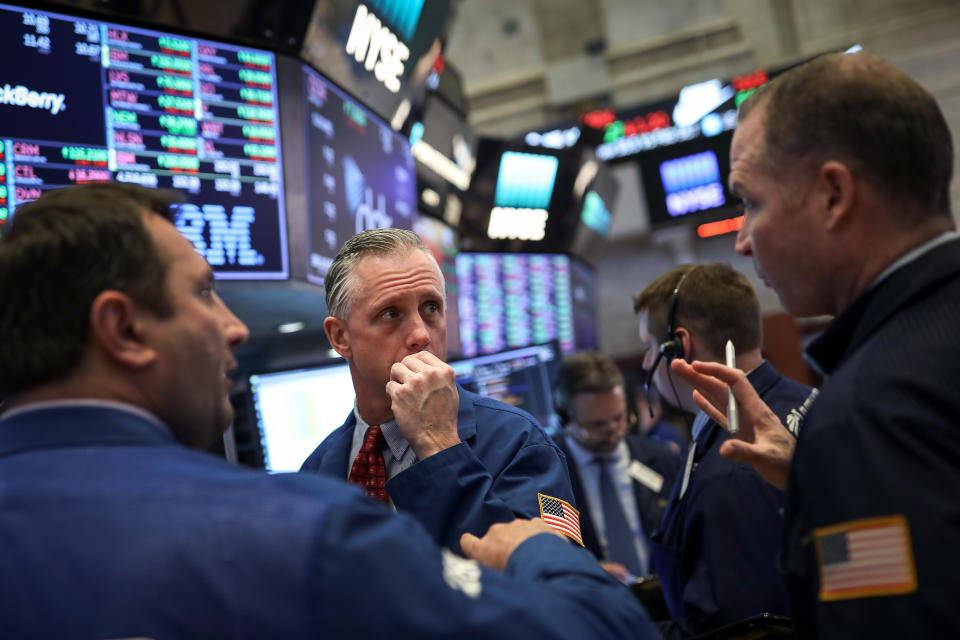Stock market news: October 25, 2019
U.S. stocks pushed higher after the Trump administration said it was making progress on a preliminary trade agreement with China. The report sent the S&P 500 surging above its record closing high, as the three major indices added to earlier gains after a batch of corporate earnings results.
At its highest point Friday, the S&P 500 rose to as much as 3,027.39, surpassing the closing high of 3,025.86 it reached in late July. It came within one point of its all-time intraday high of 3,027.98.
Here’s where the markets settled Friday:
S&P 500 (^GSPC): +0.41%, or 12.26 points
Dow (^DJI): +0.57%, or 151.58 points
Nasdaq (^IXIC): +0.7%, or 57.32 points
10-year Treasury yield (^TNX): +3.2 bps to 1.798%
WTI crude oil prices (CL=F): +0.7% to $56.66 per barrel
Gold (GC=F): +0.19% to $1,507.60 per ounce
In a statement, the Office of the U.S. Trade Representative said Robert Lighthizer and Treasury Secretary Steven Mnuchin spoke Friday with China’s Vice Premier Liu He to discuss a phase one deal between both countries.
“They made headway on specific issues and the two sides are close to finalizing some sections of the agreement,” the statement said. “Discussions will go on continuously at the deputy level, and the principals will have another call in the near future.”
Meanwhile, investors weighed a mix bag of corporate earnings to the upside, shrugging off earlier declines after mega-cap Amazon (AMZN) reported a disappointing quarter. The Dow rose more than 100 points as shares of component company Intel (INTC) surged more than 8% after the chipmaker topped third-quarter expectations and guidance.
The busiest week for earnings season has provided investors with a mixed picture of the state of corporations. Against a backdrop of slowing global growth and ongoing trade concerns, the current slate of quarterly reports have managed – or in some cases failed – to navigate the choppy macroeconomic picture.
Earnings misses from major bellwethers including Caterpillar (CAT) and 3M (MMM) for manufacturers, and Texas Instruments (TXN) for semiconductors, reinforced the woes felt by sectors most exposed to the current environment. But the weaker-than-expected reports this week were balanced out with strong results from other closely watched names like Microsoft (MSFT), Tesla (TSLA), and Blackstone (BX).
Amid the deluge of reports, the three major domestic stock indices each posted weekly advances. The S&P 500 rose 1.2%, the Dow rose 0.7% and the Nasdaq climbed 1.9% for the week.
EARNINGS: Amazon’s shipping costs strike again
Amazon (AMZN) missed third-quarter earnings expectations and gave a disappointing fourth-quarter forecast as higher shipping costs associated with one-day deliveries crimped margins during yet another quarter. Profit dropped on a year-over-year basis for the first time in more than two years during the period, coming out to $4.23 per share, versus the $4.59 expected, according to Bloomberg-compiled consensus data.
Operating margins shrank over last quarter to 4.5%, from 2.9% in the second quarter and 7.4% in the first, and sales growth in its higher-margin Amazon Web Services business sank below 40% for a second consecutive quarter.

Amazon said it expects the push to expand one-day delivery will cost about $1.5 billion in the fourth quarter — far higher than the around $800 million it originally forecasted in spending. During each of the two quarters prior, it exceeded that amount. It also expects holiday-quarter revenue will be as much as $86.5 billion, short of the $87 billion consensus analysts were anticipating.
Visa (V), on the other hand, topped expectations on the top and bottom lines for the third quarter. However, the stock fluctuated between gains and losses during overnight trading as investors considered the miss on cross-border volumes, an area where Visa is able to capture higher fees than domestic transactions. The company has also been shelling out more on incentives to lure bank and retail partners to its network.
Cross-border transactions rose 7% in the third-quarter, 50 basis points below consensus expectations. Visa’s had $1.7 billion in incentives – a contra-revenue item – during the quarter, rising 13% over last year. Visa expects client incentives will be 22.5% to 23.5% of gross revenues in fiscal 2020.
AB InBev (BUD), the maker of Corona and Stella Artois, posted a major miss on third-quarter earnings and slashed its full-year profit guidance, sending U.S.-listed shares sinking in early trading. Third-quarter underlying earnings per share came out to 94 cents, or 12 cents short of expectations. Organic revenue, which strips out factors including currency impacts, grew just 2.7% year-over-year, versus a 4.7% increase expected.
Calling out a “challenging” quarter, the Belgium-based company posted a drop in beer shipments both in China and the U.S., amid a decline in domestic beer consumption trends in the U.S. The company said it now expects only moderate EBITDA growth in fiscal 2019, as the “additional headwinds” faced in the third quarter will likely continue into the fourth, AB InBev said.
Verizon (VZ), the parent company of Yahoo Finance, topped third-quarter expectations as both post-paid wireless and pre-paid customers rose during the quarter. Adjusted earnings per share were $1.25 during the quarter, a penny better-than-expected, while revenue of $32.9 billion also came in ahead of the $32.7 billion consensus.
Total wireless subscribers jumped by 601,000 in the quarter, more than double that in the same period last year. Verizon launched 5G services in 13 new cities during the quarter.
—
Emily McCormick is a reporter for Yahoo Finance. Follow her on Twitter: @emily_mcck
Read more from Emily:
FedEx CEO: ‘Whistling past the graveyard’ on the U.S. consumer belies a broader slowdown
There won’t be ‘billion-dollar beverage brands’ in the future: Iris Nova CEO
Iris Nova CEO calls his company the ‘Netflix’ of the beverage space
Tech companies like Lyft want your money – not ‘your opinion’
Follow Yahoo Finance on Twitter, Facebook, Instagram, Flipboard, LinkedIn, and reddit.
